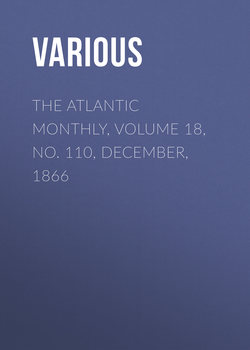The Atlantic Monthly, Volume 18, No. 110, December, 1866

Реклама. ООО «ЛитРес», ИНН: 7719571260.
Отрывок из книги
Off the southeastern extremity of Asia, and separated from it by the Chinese Sea, lies a cluster of great islands, comprising that portion of Oceanica commonly called Malaysia. Of these islands Borneo is the most extensive, and, if you call Australia a continent, it is by far the largest island in the world. Situated on the equator, stretching from 7° of north to 4° of south latitude, and from 108° to 119° of east longitude, its extreme length is 800 miles, its breadth 700, and it contains 320,000 square miles,—an area seven times as great as that of the populous State of New York.
But though its size and importance are so great, though it was discovered by the Portuguese as early as 1518, though several European nations have at various times had settlements on its coasts, though it is rich in all the products of a tropical clime, and in base and precious metals, diamonds and stones, and though its climate, contrary to what might have been expected, is in many localities salubrious even to an American or European constitution, yet until recently almost nothing was known by the world of its surface, its products, or its inhabitants.
.....
The first duty which claimed attention was the relief of the native Dyaks. A shrewd Dyak once defined the Malay government as "a plantain in the mouth and a thorn in the back." A plantain giving to their poor subjects a little to keep life in them; a thorn stripping them to the skin and piercing them to the bone. The description is pithy, and it is true. The exactions of the Malay chiefs were almost beyond belief. Seizing and monopolizing some article of prime necessity,—salt perhaps,—they would force the natives to buy at the rate of fifty dollars' worth of rice for a teacup of salt; until the wretched cultivator, who had raised a plentiful crop, was brought to the verge of starvation. They reserved to themselves the right of purchasing the articles which the Dyaks had to sell, and then affixed to those articles an arbitrary price, perhaps less than a five-hundredth of their real value. They would send a bar of iron two or three feet long, and having an intrinsic worth of a few cents, to the head mart of a tribe, demanding that his village should give for it a sum equal to five, ten, or twenty dollars. Another was sent in the same way, and another, and another, until the rapacity of the chiefs was satisfied, or the wretched natives had no more to give. Often, when the latter had been robbed of everything, the Malays would seize and sell their wives and children. It is recorded of one tribe, that there was not so much as one woman or child to be found in it. All had been swept off by these remorseless slave-hunters. Nor did their wrongs end here. If a Dyak killed a Malay "under any circumstances of aggression," he was put to death, often with every possible addition of torture. If he accidentally injured one of the ruling caste, he was fortunate to escape with the loss of half or two thirds of his little savings. On the other hand, a Malay might kill as many Dyaks as he pleased, and if perchance justice were a little sterner than usual, he might be fined a few cents or a few dollars. Volumes are contained in this one statement, that in the ten years from 1830 to 1840, the Dyaks in the province of Sarawak dwindled from 14,000 to 6,000 souls.
A blow was immediately struck at the root of this black oppression. As soon as the new government was fairly established, a few simple enactments were published. They declared that every man, Dyak as well as Malay, should enjoy unmolested all the gains of his toil; that all exactions of every name and nature should cease, and that only a small tax, evenly distributed, should be levied for the support of government; that all roads and rivers should be free to all; that all molestation of the Dyaks should be punished with severity. The proclamation which contains these laws concludes with exhorting all persons who are disposed to disturb the public peace to take flight speedily to some other country, where they can break with impunity the laws of God and man. These enactments were firmly executed, without fear and without partiality. Wonderful were the results! Internal violence ceased. The confidence of the natives was awakened. Industry and enterprise sprang up on every hand as by magic. Sarawak became a city of refuge. Sometimes as many as fifty fled thither in a day. In 1844, in the short space of two months, five hundred families took shelter in the province. In 1850, three thousand Chinese fled from Sambas to Sarawak. The Dyaks returned the good-will of their Rajah with love and reverence. During one of his tours in the interior, delegations from tribes numbering six thousand souls came to seek his protection. "We have heard," said they, in simple but touching language, "that a son of Europe has arrived, who is a friend of the Dyaks." When he visited the native hamlets, the women would throw themselves on the ground and clasp his feet, and the whole tribe would spend the night in joyful feasting and merriment. It is soberly affirmed by a credible witness, that on one occasion messengers came fifteen days' journey from a distant province to see if there were such a phenomenon as Dyaks living in comfort.
.....